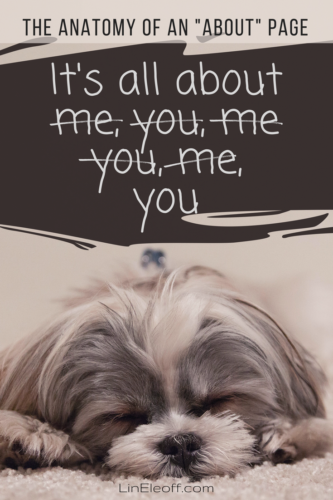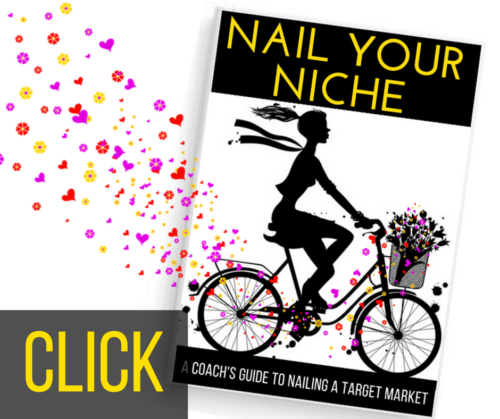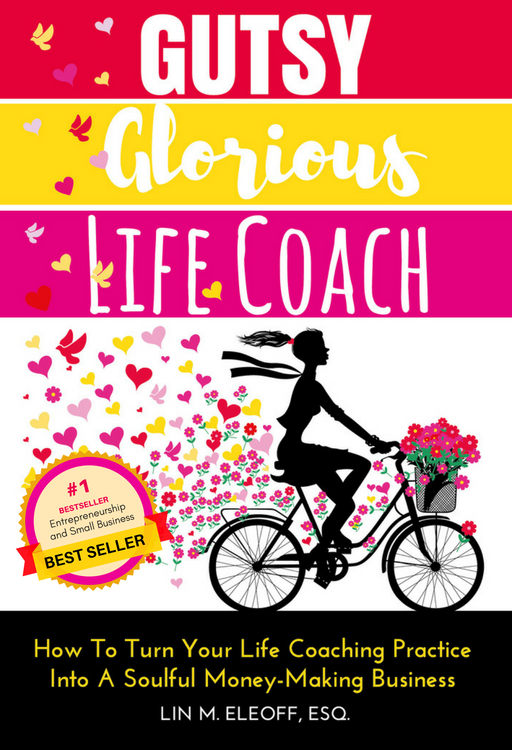Your ABOUT page is the most important page on your website.
Quite simply, it’s your site’s beating heart.
Think about it, when you go to someone’s website for the first time and you’d like to know more about the person behind the blog posts and images, what do you do?
Exactly!
You drag your cursor up to the navigation bar and search for “About.” (That’s why you shouldn’t get cute with words in your nav bar… call it “About” and not something like, “Meet Diane” or “Let’s Say Hello.” Keep it simple so the reader knows exactly where to click.)
Click.
Now, think about this: What the reader does next depends entirely on whether your About page is compelling or not. If it doesn’t grab the reader by the heartstrings, they’ll be gone, and chances are they won’t be back.
Noooooooo. Wait. Come baaaaaaaack!
First Things First
Do you know who your ideal “dream” reader is?
Because that’s the very first step.
Why is she coming to your little place on the Internet? What brought her here? What is she looking for?
What keeps her up at night?
Before you start writing anything you must have a very clear picture about who you’re inviting to your website. If you don’t know this you won’t be able to write compelling copy, whether it’s for your About page or any page on your website.
Your reader lands on your About page expecting to learn something meaningful about you and I promise you it’s not about your education and how many degrees you have, or your numerous accomplishments, or how many dogs and cats you own and love.
She wants to know if you know about her.
Do you know how she’s feeling?
What she’s thinking?
What worries her?
Can you convey to her that you get her?
Because that’s what she’s looking for. She’s looking for…
Connection
Your About page is all about making a connection with the reader.
It’s not supposed to be a recounting of your whole life. It’s not a resumé.
It’s called an About page because the reader thinks she want to know more about you, but really, she just wants to find out if you truly understand what she’s all about.
In order to make that connection you have to know exactly who your “ideal” reader is. As in, E-X-A-C-T-L-Y.
If your ideal reader is also a dog or cat lover, if you believe that’s important information for her to know, then by all means include that. But every bit of info you include must have a purpose, and it cannot be about satisfying your ego.
Now, if you’ve heard words like ideal reader and ideal client and avatar and niche and target market before, to the point where you’ve become deaf to it, well then, Coach, we have a problem. I’ll get to the structure of an About page in a moment, but first…
LISTEN UP, PLEASE
Un-deaf yo’self!
As eye-roll inducing as it may sound, you simply must do the foundational work of knowing who your ideal DREAM client is, what keeps her up at night, and why your solution is better than anyone else’s.
You also have to be able to conjure up your client in your mind.
And give her a name.
Mine’s name is Carrie. I utterly adore her!
In my DIY program, “Nail Your Niche,” I meticulously walk coaches through all the steps of really understanding what it is they “do,” because there’s nothing worse than stammering and stumbling when someone asks you what you do!
Try it now… I’m asking: “What do you do?”
If the answer’s not rolling off your tongue, you’ve got some work to do.
Here’s what you need to do first, before you start writing anything:
- Identify the people you really want to serve — clients you can get excited about working with;
- Get clear about what makes you an “authority” in the market you want to serve;
- Learn to speak the exact language of your clients so that you understand their problem better than they do.
When you’re armed with that information, writing compelling copy becomes much easier.
I think this is one of the reasons new coaches struggle for so long… they don’t have clarity around what they “do” in such a way that makes it easy to talk and write about themselves and the market they serve.
So, to the extent that you know YOU and YOUR CLIENTS, your About page will either be easy or difficult to write.
“WHAT DO YOU DO?” IS A LOADED QUESTION
Like the About page, it has the expectation that your answer will be something the asker of the question will be able to relate to. If not, they’ll be bored and walk away. It only takes six seconds.
Your About page is about showing and telling how much you relate to the reader.
The copy must be compelling.
How many times have you read someone else’s About page and thought, “Jeesh, how is this relevant to anything?”
That’s because they’re treating their About page like a curriculum vitae. No one wants to read your CV.
They want to read about how you are like them and they are like you.
They want to be thinking, “Wow, she gets me. She understands how I’m feeling. She’s been there.”
The reader must feel a connection.
You want her to know you understand her because you’ve been exactly where she is, or you’ve helped people who have been where she is.
The About page is often where your relationship with the reader begins and all they really care about is whether you have a solution to the problem they’re struggling with.
Don’t be afraid to show your personality. Write like you talk. Shakespearean prose or college essay grammar is not needed here.
Here’s an example of an artfully written About page. It’s Amy Porterfield’s and you get the sense that while she’s telling her story she’s also telling the story of her ideal client.
But first, she clearly took the time to really understand exactly who her ideal client was and then she wrote about herself, but in a way that Amy’s ideal readers (people trying to build an online business) could easily relate to.
If you’re looking for some structure to help you write your first About page, this might help:
THE ANATOMY OF AN ABOUT PAGE
 1. Make A Statement
1. Make A Statement
Don’t just say, “Welcome to my website” or something equally generic. Put some zip in it, something that shows your personality. See mine here.
2. Tell Them What You “DO”
In my Nail Your Niche Formula I show you how to craft what I call a Simple 3-Sentence Summary that will guide you throughout this process. Basically you’re telling people what you do but, again, it’s not generic. Something like,
“My name is Lin Eleoff and I’m an Internet business lawyer and certified professional “rock your life” coach. That’s the official “title” but really I like to think of myself as a “tribe builder” of women who are upping their game. It has a lot to do with that thing that happens to us after we turn 40. We feel the call to get it “right.” There’s no more time for futzing around.”
3. What Brought You “Here”?
This is where you want to start to establish your authority. Tell them about yourself, but only as it relates to what your reader is looking for. This is not the time to start talking about your family or your dogs or your PhD in something that is totally unrelated to your client’s topic of concern.
4. How Can You Help?
Talk about their “problem” and the solution you have. You’ve done your research by now (right?) and you know what they’re saying in their minds. Make sure you’re using their language to describe what YOU can do to help them, why your solution is different. What sets you apart from other coaches.
5. Call To Action
As I always say, each page of your website must have a job to do. This page is an opportunity to get people to opt-in to your email list. Make sure you have an opt-in box at the bottom of the page with your free offer that will give them a “taste” of the solution.
Questions? Bring them over to our private FACEBOOK GROUP just for coaches.
HEY COACH,
Are you sloggin’ it out at home, alone, doing some of this and some of that and then feeling overwhelmed because it’s ALL. TOO. MUCH.
Join the FREEDOM MASTERMIND. It’s a tribe of coaches who are working to turn their coaching practice into a business (there’s a BIG difference!) Learn more HERE.


